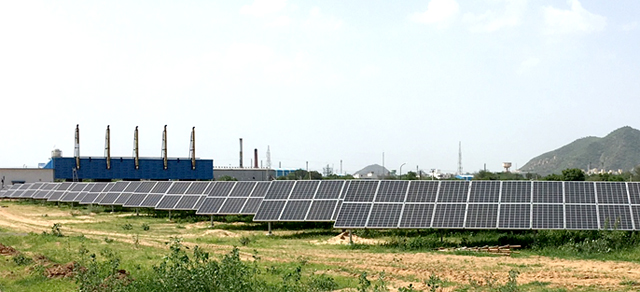NEDO — an industrial R&D entity under the Japanese government — has provided roughly ¥3.4 billion of the pilot project’s total ¥3.9 billion ($35.2 million) investment. Its partners — Japanese industrial group Hitachi, IT services provider Hitachi Systems and Tokyo-based conglomerate Itochu — will operate the microgrid system for a two-year period under the Delhi-Mumbai Industrial Corridor (DMICDC), a bilateral infrastructure development project.
The project will test microgrid control technologies and the effectiveness of Japanese solar panels in the hot, arid conditions of western India. However, NEDO did not reveal which company supplied the solar panels. The roles of Hitachi, Hitachi Systems and Itochu in the demonstration project also remain unclear.
“The aim of the demonstration is to verify the effectiveness of Japan's microgrid technology and encourage its dissemination throughout India,” NEDO said in an online statement. “Chronic power shortages… have left the country with an unreliable power supply at a time when companies that operate production facilities in India have a pressing need for reliable power to ensure stable operations.”
The system — which has been designed to ensure the stability of electricity supplied by solar arrays — includes PV modules and several diesel generators. It will be tested for a period of two years, to ensure that it can offer a stable supply of electricity, while minimizing the use of diesel fuel.
The microgrid will provide electricity to Mikuni India, a company with offices in an industrial park in Neemrana, in the state of Rajasthan. The 220.5-hectare industrial zone was established in 2008 in cooperation with the Japan External Trade Organization (JETRO).
Separately, NEDO said that other undisclosed Japanese companies and organizations are still testing 5 MW of thin-film solar capacity that was installed in the industrial park in July 2015. The tests are being carried out to determine whether Japanese thin-film PV modules can function properly under the high solar radiation conditions of western India.
Kawasaki-based NEDO has funded a number of renewables-powered microgrid pilot projects in recent years. In early 2015, NEDO backed a microgrid demonstration project spearheaded by Takaoka Toko — a subsidiary of Tokyo Electric Power (Tepco) — and French battery producer Saft. The five-year pilot is testing the use of lithium-ion storage batteries in combination with PV modules and wind turbines on Niijima, a remote island south of Tokyo.
And in March 2016, NEDO started operating a wind and microgrid demonstration project in Ust-Kamchatsk, on eastern Russia’s Kamchatka peninsula. The one-year pilot — launched in cooperation with Mitsui & Co. and Fuji Electric — was designed for Russian state-run power producer RAO Energy Systems of the East (RAO).
This content is protected by copyright and may not be reused. If you want to cooperate with us and would like to reuse some of our content, please contact: editors@pv-magazine.com.



3 comments
By submitting this form you agree to pv magazine using your data for the purposes of publishing your comment.
Your personal data will only be disclosed or otherwise transmitted to third parties for the purposes of spam filtering or if this is necessary for technical maintenance of the website. Any other transfer to third parties will not take place unless this is justified on the basis of applicable data protection regulations or if pv magazine is legally obliged to do so.
You may revoke this consent at any time with effect for the future, in which case your personal data will be deleted immediately. Otherwise, your data will be deleted if pv magazine has processed your request or the purpose of data storage is fulfilled.
Further information on data privacy can be found in our Data Protection Policy.